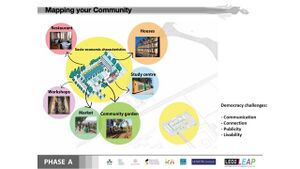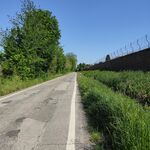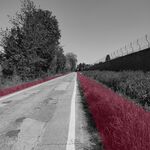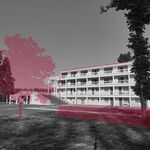LED2LEAP 2022 - Bologna Team
>>>back to working groups overview
For help with editing this Wiki page use this link.
For more details on assignments and key readings please use this link.
Landscape Democracy Rationale
Villa Salus will not only be a place of residence, but a path of accompaniment to the self-entrepreneurship of migrants and refugees for the guided creation of start-ups of social enterprises and for the management of services, with a direct role of social enterprises to welcome guests. of the structure and the citizens, who here will find green spaces, places for the treatment of psycho-physical well-being, cultural activities, artistic workshops, coworking spaces and accommodation and catering activities
Location and Scope
- You can edit this map with the map editor
Phase A: Mapping Your Community
Welcome to Your Community and Their Landscape
“SALUS SPACE” is located in the suburbs of Bologna and the whole area is 9060 square meters. This project is developing a center consisting of residential houses for around 80 people ranging from refugees to people from families in vulnerable situations, a social cooperative restaurant, a bar, handicraft workshops, vocational training, a theater, and vegetable gardens.
Groups of Actors and Stakeholders in Your Community
- Salus Space is a project funded mainly by the European Union through the program "Urban Innovative Action" and is supervised by the Municipality of Bologna. On a local scale the project is coordinated by six NGOs that work together with other partners; the most important out of these is ETA BETA.
Relationships Between Your Actors and Groups
these is ETA BETA
- Addyouruniqueimagename.jpg
insert text here
- Addyouruniqueimagename.jpg
insert text here
- Addyouruniqueimagename.jpg
insert text here
Summary of Your Learnings from the Transnational Discussion Panel
hs="200px" height
Theory Reflection
As said in most of the articles, and reading sources, the base of connection between landscape and democracy is that people exploit their right to a place which could be said is formed by nature and affected by human being’s activity, especially in the today’s world which is affected by innovation and technology changing how people communicate and live.
Nowadays with the uncontrollable speed of technology, there should be a way to compare the advantages and disadvantages of the effects that the new things which affect nature and human beings, will bring in future.
the right to landscape and the way it is taught and the way the knowledge is transformed would be a better way to control the outcomes.
Also, when it comes to the rights of people or the right of nature to the landscape, it is not only an ecological matter, it also involves social aspects and in this case, the transformation of knowledge, participation and everything that connects the field of academy to the field of everyday life with its real problems could play an important role to make the results more convenient and more representative of all the people involved.
In terms of defining the bases of science system in Salus project, the reflexivity is traced in the dynamic atmosphere of the project which propels the learning process. But it is still not clear how much the dynamics of the project could be adopted in other parts of the area or city.
Participation is found in the actor groups, which according to the writer are the groups that find calmness in participation whether there are in a participatory area or not. Refugees or people under pressure try to relieve by being together but for people in normal condition it is not clear how much they want to be involved.
Innovation is also seen in the project but it should be studied whether the Innovative and the approach toward future is well explained to the actor groups or not.
For example is there any authority organizing the area, or if there are only people putting standards and if the authority is removed theses standards will remain and the area will not change into an abandoned place.
Balancing power exists or not? Do the people feel they are a part of society or do they feel they are left and these things are an amenity to them.
References
- insert text here
Phase B: Democratic Landscape Analysis and Assessment
Isabella and The Travel Diary
Strada per salus.jpeg As we thought, CONNECTION and VISIBILITY are still problematic
Mancail marciapiede.jpeg ISOLATION and poor means of transport system create an island were Salus Space lives
Orto.jpeg The attention to the ENVIRONMENT and the GREEN TRANSITION are central in the project
Edificio.jpeg The structure is NEW but it’s still difficult to understand the USES of the different areas
New strada.jpg better SIGNAGE and CONNECTIONS
New marciapiede.jpeg creation of SIDEWALKS to reach the structure safely
New edificio.jpeg creation of CELLARS/BASEMENT for the use of the inhabitants, rearrangement of the VEGETATION according to bioclimatic concepts
Aniseh Saber: "A Picture is Worth A Thousand Words"
Mana
FRANCESCA
- Addyouruniqueimagename.jpg
insert text here
- Addyouruniqueimagename.jpg
insert text here
- Addyouruniqueimagename.jpg
insert text here
SELIN
- Addyouruniqueimagename.jpg
insert text here
- Addyouruniqueimagename.jpg
insert text here
- Addyouruniqueimagename.jpg
insert text here
TUYEN
- Addyouruniqueimagename.jpg
insert text here
- Addyouruniqueimagename.jpg
insert text here
- Addyouruniqueimagename.jpg
insert text here
Phase C: INSERT TITLE OF PHASE C
Your Prototyping Action
- insert text here
The Story of Visioning
- insert text here
- Addyouruniqueimagename.jpg
insert text here
- Addyouruniqueimagename.jpg
insert text here
- Addyouruniqueimagename.jpg
insert text here
Reflect on Your Story of Visioning
- insert text here
- Addyouruniqueimagename.jpg
insert text here
- Addyouruniqueimagename.jpg
insert text here
- Addyouruniqueimagename.jpg
insert text here
Phase D: Collaborative Design, Transformation and Planning
Your Prototyping Action
- insert text here
- Addyouruniqueimagename.jpg
insert text here
- Addyouruniqueimagename.jpg
insert text here
- Addyouruniqueimagename.jpg
insert text here
The Evolution of Your Prototyping Action
- insert text here
- Addyouruniqueimagename.jpg
insert text here
- Addyouruniqueimagename.jpg
insert text here
- Addyouruniqueimagename.jpg
insert text here
The Plan Behind Your Prototyping Action
- insert text here
- Addyouruniqueimagename.jpg
insert text here
- Addyouruniqueimagename.jpg
insert text here
- Addyouruniqueimagename.jpg
insert text here
The Realization of Your Prototyping Action
- insert text here
- Addyouruniqueimagename.jpg
insert text here
- Addyouruniqueimagename.jpg
insert text here
- Addyouruniqueimagename.jpg
insert text here
Reflect on Your Prototyping Action
- insert text here
- Addyouruniqueimagename.jpg
insert text here
- Addyouruniqueimagename.jpg
insert text here
- Addyouruniqueimagename.jpg
insert text here
Phase E: Collaborative Evaluation and Future Agendas
Collaborative Evaluation and Landscape Democracy Reflection
- insert text here
- Addyouruniqueimagename.jpg
insert text here
- Addyouruniqueimagename.jpg
insert text here
- Addyouruniqueimagename.jpg
insert text here
The Actors in your Collaborative Evaluation
- insert text here
- Addyouruniqueimagename.jpg
insert text here
- Addyouruniqueimagename.jpg
insert text here
- Addyouruniqueimagename.jpg
insert text here
Reflection on the Online Seminar
- insert text here
- Addyouruniqueimagename.jpg
insert text here
- Addyouruniqueimagename.jpg
insert text here
- Addyouruniqueimagename.jpg
insert text here
Reflection on your Living Lab Process
- insert text here
- Addyouruniqueimagename.jpg
insert text here
- Addyouruniqueimagename.jpg
insert text here
- Addyouruniqueimagename.jpg
insert text here
Your Living Lab Code of Conduct
- insert text here
- Addyouruniqueimagename.jpg
insert text here
- Addyouruniqueimagename.jpg
insert text here
- Addyouruniqueimagename.jpg
insert text here
Process Reflection
- insert text here



















